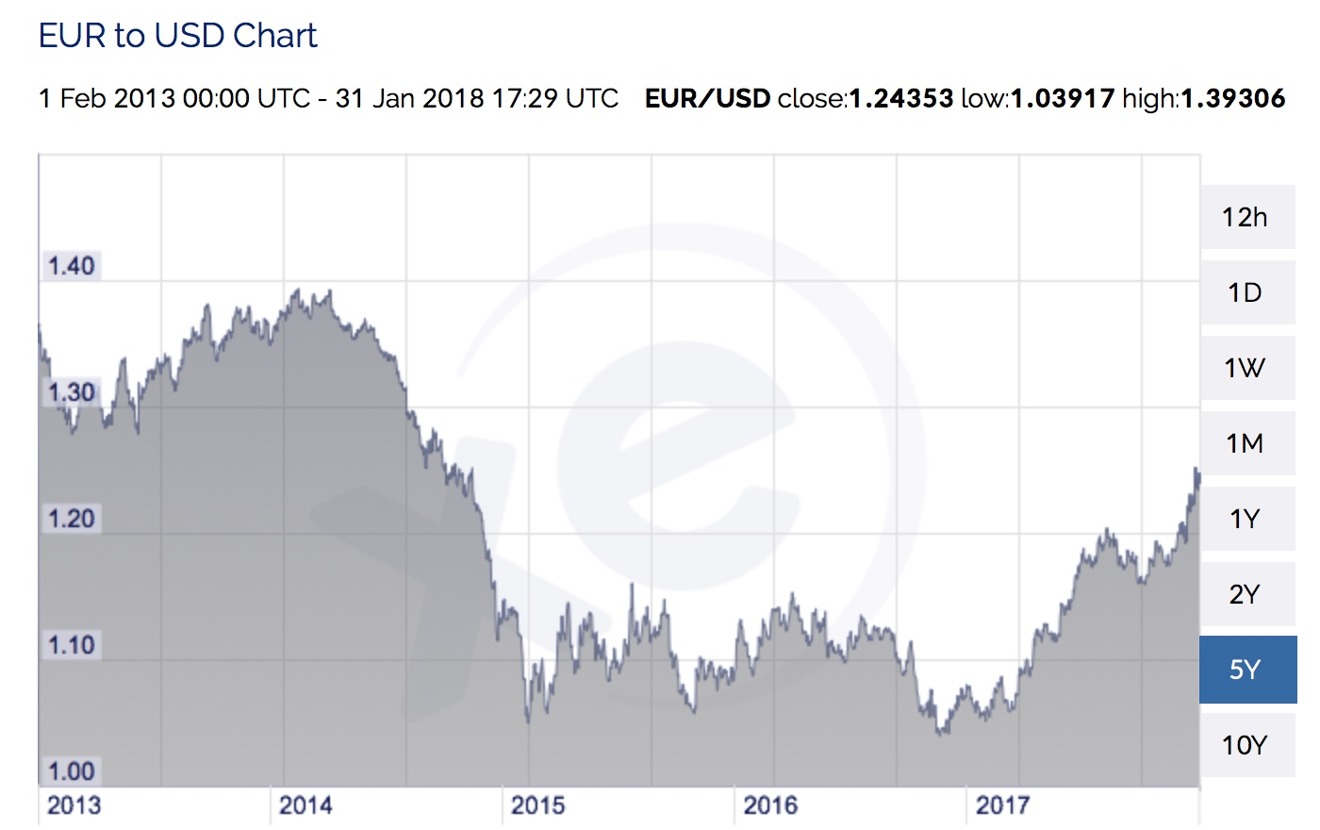Over the past year, the weakening U.S. dollar has created an increasingly favorable currency exchange environment boosting the value of Apple's foreign revenues as stated in dollars. That will have a significant impact on the company's quarterly earnings reported tomorrow.
Unclear policy, clear downward trajectory
Political turmoil in the United States is weakening the value of American currency. Speaking at a press conference at the World Economic Forum in Davos last week, U.S. Treasury Secretary Steven Mnuchin stated, "obviously a weaker dollar is good for us as it relates to trade and opportunities," adding that its short-term value is "not a concern of ours at all."
Shortly afterward, President Trump told reporters Mnuchin's comments were "misinterpreted" and stated that "the dollar is going to get stronger and stronger, and ultimately I want to see a strong dollar."
At the same time, Trump also announced last April, "I think our dollar is getting too strong, and partially that's my fault because people have confidence in me. But that's hurting— that will hurt ultimately."
Those comments were made after four months of the dollar sliding against other currencies. They also helped stoke a further drop in valuation. And since then, the U.S. dollar has been on a generally negative trajectory— not unrelated to the lack of any clear U.S. policy.
Apple's foreign currency headwinds change course
The formerly strong U.S. dollar began to have a notable impact on Apple's earnings reports starting in 2014, and has repeatedly been cited by the company as negatively affecting its earnings in a number of ways. So for Apple, a weaker dollar is a welcomed change. The formerly strong U.S. dollar began to have a notable impact on Apple's earnings reports starting in 2014 and has repeatedly been cited by the company as negatively affecting its earnings
In its Fiscal 2014 10K filing, the company noted that weakening foreign currencies "adversely affects the U.S. dollar value of the Company's foreign currency-denominated sales and earnings," and added that a stronger dollar generally results in the company being forced to raise its prices overseas, with the potential result of reducing demand as buyers balk at paying more for the same thing.
In 2015, the strengthening dollar caused Apple to raise prices in its stores ranging from Australia, Canada, New Zealand, France, Denmark, Sweden, Finland and Portugal.
In the summer of 2016, Britain's vote to leave the European Union caused the British Pound to fall dramatically against the dollar, resulting in an up to 20 percent price hike on some Mac models in the U.K., followed by a 25 percent hike in price tiers in its App Store earlier this year.
Last January, Apple's chief executive Tim Cook noted that China's currency had devalued by 6 percent year over year compared to the dollar. The shift was large enough to prompt the company to report non-GAAP earnings on a constant currency basis to isolate its actual performance from the currency shifts out of its control.
Other American companies operating internationally have suffered from the same unfavorable currency headwinds, although Apple generally weathered these fluctuations better than many of its peers simply because it is so profitable and because it has the capital and credit to enter long-term hedging contracts to mitigate risk.
At the same time, the impact of foreign currency shifts in China has been a much larger issue for Apple than companies like Facebook, Google, Microsoft and U.S. hardware makers— few of whom have been able to materially penetrate the Chinese market at all, let alone making it a leading chunk of their business.
Apple also took advantage of the stronger dollar's purchasing ability to invest in large infrastructure, production and retail projects internationally, including a series of new retail stores in China, its massive new Battersea Power Station development in London, and a string of research and development facilities being built around the world.
American political chaos disrupting markets
Strong earnings in the year-ago winter quarter jolted Apple's stock price upward despite foreign currency headwinds. Apple shares continued to rise on apparent optimism that a new Republican president— backed by Republican control of both chambers of Congress— could quickly implement business-friendly tax breaks, including lower repatriation rates on Apple's very large overseas earnings.
However, that optimism turned out to be misplaced. Efforts to slash health care spending to enable very large tax breaks was derailed by populist resistance that fragmented the controlling political party, delaying the passage of health care cuts and efforts to shift tax policy to the end of 2017.
Proposed travel bans, restrictions on visas, the halting of infrastructure spending and the postponement of a repatriation tax holiday that Apple and other Silicon Valley companies had been working with Hillary Clinton to draft as part of a series of tech-friendly policy positions remained causes for concern throughout the year.
American political turmoil began hurting the dollar's valuation. That has had a positive impact on Apple's global profitability for nearly a year now, even if it also has increasingly made it more expensive for Americans to travel abroad or buy foreign products.American political turmoil is hurting the dollar. That has had a positive impact on Apple's global profitability
The Euro, which nearly reached $1.40 in early 2014, fell down to $1.04 at the end of 2016. Today it's now back up above $1.24, a three year high against the dollar.
The British Pound, which reached $1.71 in 2014, fell as low as $1.22 after Brexit but has since inched back up to $1.42.
The Japanese Yen reached up to 124 in 2015, then collapsed to nearly 100 in the winter quarter of 2016; over the holiday season it reached as high as 113 against the U.S. dollar.
China's RMB steadily depreciated against the USD since 2014 when reached as low as 6.11. It climbed to 6.94 against the USD last January. Today, the Chinese Yuan Renminbi is also approaching a three year high at 6.28 against the USD.
A weaker dollar means that Apple is now making more money (as enumerated in dollars) in a variety of territories at its current prices. It also holds the potential for Apple to lower its prices on hardware and apps overseas, a move that could be expected to induce demand. It remains to be seen how the U.S. dollar will compare going forward, but Apple is no doubt relieved to see more favorable exchange rates that will help it to boost its ability to earn money overseas.
 Daniel Eran Dilger
Daniel Eran Dilger







-m.jpg)






 Christine McKee
Christine McKee
 Charles Martin
Charles Martin
 Mike Wuerthele
Mike Wuerthele
 Marko Zivkovic
Marko Zivkovic
 Malcolm Owen
Malcolm Owen


 William Gallagher
William Gallagher


-m.jpg)






21 Comments
A weak dollar makes exports more competitive but to exploit this they need to reduce prices to increase sales. Apple increased UK prices in 2016 after the £ devaluation following Brexit but despite the dollar weakening since prices remain high in the UK - notably high - I was always an early adopter but no longer, the cost makes you think twice.
The only product which occurred to me that was lower than anticipated was the HomePod which I expected to be £349 to follow the previous $ parity trend, but it is £319 in the UK. Still probably £19 too much however.
I like all of DEDs article - always provides a good context and thoughtful analysis. I don’t agree with the “political turmoil” cause - looking historically over the last 40 years, nothing much has changed. The business and investor judgement can be quantified by the stock market. Currency fluctuations are complex, and single issue blame is usually too simplistic unless there is a war involved.
Another great article - thanks ai and DED!
Pretty great timing for Apple since they are now returning millions/billions of dollars back to the USA.